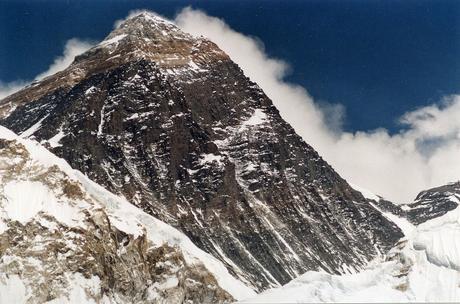 If you've read the book Into Thin Air, or know about the events that took place on Everest back 1996, the name Beck Weathers is one that you're no doubt familiar with. Beck was on the team that was led up the mountain by Rob Hall, the same team that Jon Krakauer was a part of. On the way up the mountain, Beck had difficult seeing, and was told to wait on the Balcony at 27,000 feet (8230 meters) for Hall's return. The guide planned to assist him in descending after he had taken his other clients to the top. Rob ended up losing his life high on the mountain, and Beck was later assisted down by another guide, but as a massive storm descended on Everest, he became disoriented and lost, stumbling off into the night. During that time Beck was exposed to the extreme winds and cold, as he bivouacked alone, high on the mountain. His face and hands were exposed, and as a result he suffered severe frostbite that would later claim parts of right arm, his left hand, and both feet, as well as his nose.
If you've read the book Into Thin Air, or know about the events that took place on Everest back 1996, the name Beck Weathers is one that you're no doubt familiar with. Beck was on the team that was led up the mountain by Rob Hall, the same team that Jon Krakauer was a part of. On the way up the mountain, Beck had difficult seeing, and was told to wait on the Balcony at 27,000 feet (8230 meters) for Hall's return. The guide planned to assist him in descending after he had taken his other clients to the top. Rob ended up losing his life high on the mountain, and Beck was later assisted down by another guide, but as a massive storm descended on Everest, he became disoriented and lost, stumbling off into the night. During that time Beck was exposed to the extreme winds and cold, as he bivouacked alone, high on the mountain. His face and hands were exposed, and as a result he suffered severe frostbite that would later claim parts of right arm, his left hand, and both feet, as well as his nose.Weather's survival story is well known in mountaineering circles, and he was lucky to get off the mountain alive. He has also become an integral part of the Into Thin Air story, which will of course be told once again in the upcoming feature film Everest, which will be released in theaters in a few weeks time. In that film, Beck will be played by actor Josh Brolin, and judging from the trailer, he will be integral to the plot.
Recently, Beck sat down with Outside magazine to talk about the film, his Everest experience, and where he is at in his life now. In the interview he talks about the movie which he says is impressive and about as good as any mountaineering film can be. He also weighs in on having Brolin play him on the big screen, the challenges of making a good film about Everest, and some issues he has with the way the story is told.
Perhaps more importantly however, Weathers talks a bit about what the film does right. He points out certain areas of the movie that are moving in a very tragic way. Particularly when Rob Fischer's wife gets the phone call from him on the mountain, or Beck's own spouse receives a similar call informing her the had died. He says that those personal moments in the film will leave a mark with audiences, and were done very well.
Like Krakauer said recently, Beck carries the physical, emotional, and phycological scars from that fateful day back in May of 1996. They have shaped him into the person he is today. While that incident has had a dramatic impact on his life, he has also found ways to move on and continue with living it to the fullest. He told Outside that the real story is what happens when you get back home, which is something that is seldom told.
Read the full interview here.

